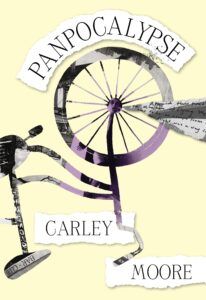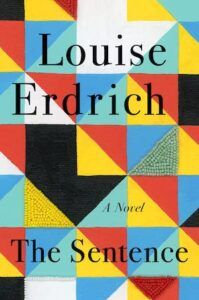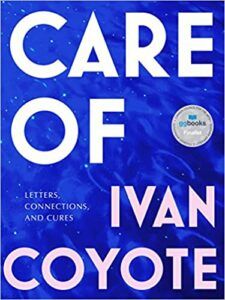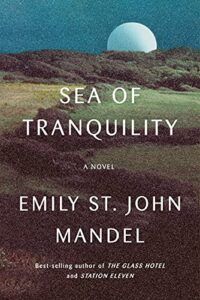Before it was published in 2022, Carly Moore serialized Panpocalypse online during the early days of pandemic. It’s set in New York City in the spring of 2020. There’s not much plot. Orpheus, the main character, is a queer disabled professor. She rides her bike around the city, looking for love, feeling lonely. There’s an eeriness and an urgency to it that I instantly connected with. Yes, I thought. This is exactly what it felt like. I was living on a tiny island when the pandemic hit, and my experience of it was nothing like Orpheus’s. Still, the book hit me right in the heart. I’d spent most of 2020 and 2021 reading fiction full of huge gatherings, fiction in which people went cheerfully on dates, flew across the country without thinking twice, didn’t carry masks, didn’t worry about their 75-year-old mothers going to the grocery store. It was strange, reading these books, disorienting. They all felt like fantasy. The next pandemic-centric book I read was The Sentence by Louise Erdrich. It came out at the end of 2021, but I didn’t read until this past summer. I had the same experience with it that I had with Panpocalypse: I fell into it hungrily. It’s set in Minneapolis, during the early days of the pandemic and the weeks and months following George Floyd’s murder. Despite centering these devastating events, it’s a quiet, character-driven book. Reading it, for me, was cathartic, healing. Again, I didn’t realize how badly I’d been craving books that reflected the reality of my world until I was reading one. The Sentence is not dramatic or sensational. Characters go about their ordinary lives. Then the pandemic comes, and life is no longer ordinary — until it is. That’s the part that settled something within me, that made me want to reach for more and more pandemic books. I was tired of having to recalibrate my understanding of “ordinary” every time I started a new novel. Discovering these pandemic books, where people go about their lives in the way that I had been going about my life for the past two years, was a revelation. This is my experience of reading pandemic books. “They’re so cathartic!” I want to shout to everyone I know. “Read them, you’ll feel better!” I’ve recommended these books over and over again, to friends and random people on the internet, wanting to give them the gift the books have given me: comfort, release, relief. But many people have looked at me askance, or told me they’re not ready. They avoid pandemic books the way I avoid very scary horror. They know what they can handle, and what they can’t. I get it. So I’m left wondering: are pandemic books cathartic or anxiety-producing? And what makes them swing in one direction or the other? Are romance novels that feature the pandemic more anxiety-producing because romance is a genre so many of us turn to for escape? Is it harder to encounter something as difficult and life-altering as the pandemic in an otherwise light-hearted romcom? Or is is cathartic and comforting, a reminder that, despite the times we’re living through, we can still find love and connection? What about books that include the pandemic and then seem to move past it? I loved R. Eric Thomas’s Kings of B’More, a YA novel about two Black queer besties trying to mend their relationship before one of them moves away. Thomas’s inclusion of the pandemic is subtle: during lockdown, Linus and Harrison, the main characters, spend months and months communicating mostly via email. But the present of the novel is set in a post-COVID world. Is it cathartic, to watch these characters wrestle with maintaining friendships during the pandemic, as many of us have had to do, and then to see them out and about in a world unlike our own, COVID a thing of the past? Or is this, in itself, anxiety-producing, a kind of wishful thinking that only drives home the fact that the pandemic is not over? What about nonfiction? I recently read Ivan Coyote’s latest book, Care Of, a beautiful collection of letters. When all of their live shows were canceled in the spring of 2020, Coyote, a trans performer, musician, and storyteller, decided to use the time to answer some of the special letters they’d received over the years. The letters aren’t about the pandemic, exactly — they’re about music and family, friendship and coming out, being trans, aging, queer community. But Coyote’s writing is steeped with the loneliness of those early months, and the overwhelming sense of intense and sudden change and uncertainty. Is it cathartic to revisit those times through somebody else’s words? Or is it still too soon? Does reading about someone’s experience of events help us work through our own thoughts and feelings from that time, or does it just remind us of how hard it was (and still is), how much we’ve lost? I don’t think these are answerable questions. I have yet to read a pandemic book I haven’t loved. I wept reading Care Of, but they were good tears, cathartic tears, tears that reminded me I’m not alone. Emily St. John Mandel’s latest novel, Sea of Tranquility, which is set in the future but features a pandemic that feels emotionally analogous to the one we’re living through, had a similar effect on me. Reading it felt like letting out a long breath I didn’t know I’d been holding. But I have friends who absolutely cannot pick up a pandemic novel: it’s still too close. It can be jarring to read about something we’re still in the midst of, something we can’t yet see from a distance. We don’t really know how this story ends. I can’t make any kind of definitive or objective statement. I can’t say, with certainty, that nonfiction books about the pandemic are more cathartic, or that pandemic thrillers are more anxiety-producing, or that, if you’re unsure about reading a pandemic book, you should stick to realistic fiction, because those ones are usually less scary and upsetting than the speculative fiction ones. As far as I can discern, there’s no pattern, no formula we can use to figure it out. Every pandemic book is going to affect every person differently. A cathartic read for me might be one that makes you anxious. A cathartic escape for someone — maybe a romance set in 2020 that ignores the pandemic — might feel like a painful denial of reality to someone else. I’m glad some authors are addressing the pandemic, in fiction and nonfiction. I’m glad other authors are avoiding it. We’re all muddling through these heartbreaking, messy, too-fast times, and reading is a part of that — reading to escape, reading to get closer to the world, reading for fun and giggles, reading to understand our own experiences. It’s okay to seek out books about the pandemic and it’s okay to avoid them. All we can do, I think, is keep reading and writing and talking, and keep paying attention to how what we read changes — or doesn’t change — how we move through the world.



